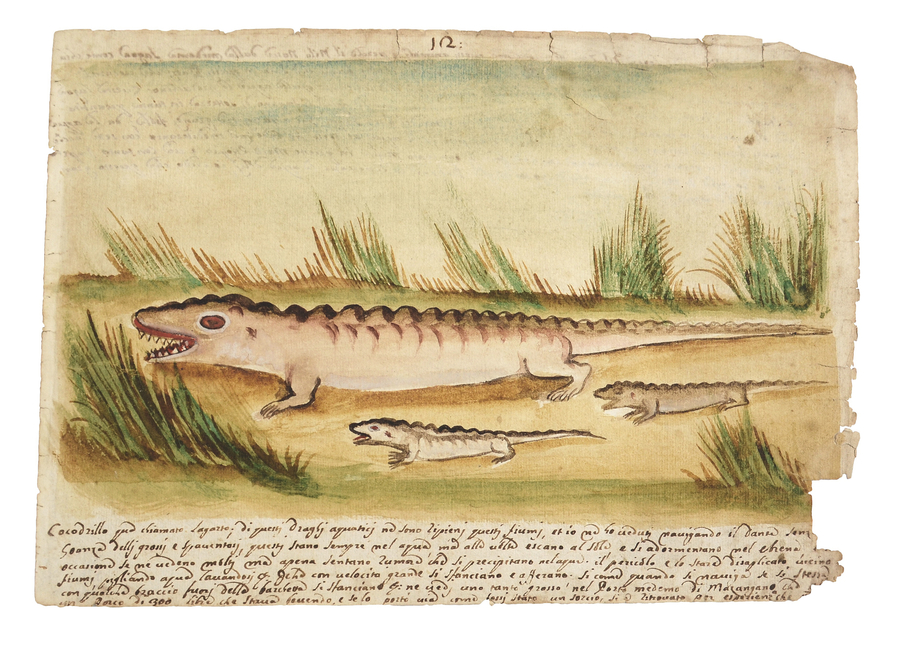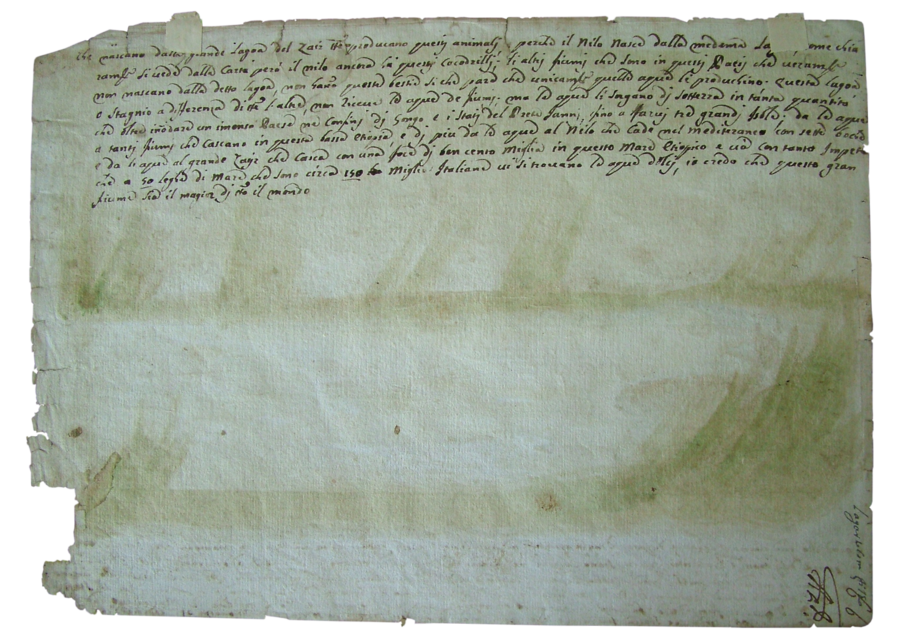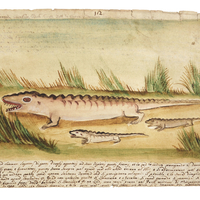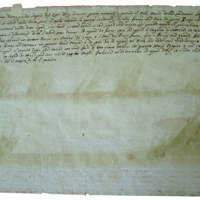PW012: Crocodile, here called Lagarto
Cocodrillo qua chiamato lagarto;1 di questi draghi aquatici ne sono ripieni questi fiumi et io ne ho veduti navigando il Dante2 senz[a] [. . .] Goanza3 delli grossi e spaventosi, questi stano sempre nel aqua ma alle volte escano al sole e si adormentano nel chena, [---] occasione se ne vedono molti ma apena sentano rumore che si precipitano nel aqua. Il pericolo e lo stare disaplicato vicino a[i] fiumi pigliando aqua lavandosi &: p[er]che con velocita grande si slanciano e afferano; si come quando si naviga se si stesse con qualche braccio fuori della barchetta si slanciano &: ne vedi uno tanto grosso nel Porto medemo di Mazangano che [---] un Porco di 300 libre che stava bevendo e se lo portó via come fossi stato un sorcio, se e ritrovato per esperienza che [. . .]
[verso] che nascano dalla grande lagoa4 del Zair t[u]tte producano questi animali perche il Nilo nasce dalla medema lagoa come chiaramte si vede dalla carta peró il nilo ancora hà questi cocodrilli; li altri fiumi che sono in questi Paesi che veramte non nascano dalla detta lagoa, non han[n]o queste bestie si che pare che unicamente quelle aque li produchino; Questa lagoa o stagnio a differenza di t[u]tte l’altre, non riceve le aque de fiumi; ma le aque li sorgano di sotterra in tanta quantità que oltre inõdare un imenso Paese ne confini di Gongo e i stati del Prete Janni,5 fino a farvi tre grandi Isole; da le aque e da le aque a tanti fiumi che cascano in questa bassa etiopia, e di piu da le aque al Nilo che cade nel mediteraneo con sette boche e da l’aque al grande Zair che casca con una foce di ben cento miglia in questo mare etiopico e và con tanto Impeto que a 50 leghe di mare che sono circa 150 miglia Italiane vi si trovano le aque dolci, io credo che questo gran fiume sia il magior di tutto il mondo
[verso in Portuguese] lagarto com filho
Crocodile here called Lagarto; these rivers are full of those aquatic dragons, and I have seen some large and frightful while navigating the Dande [without] [. . .] Kwanza; these are always in the water, but sometimes they get out into the sun and fall asleep on the shore [. . .] occasion one can see many of them but as soon as they hear a noise, that they rush into the water. The danger is to be careless near rivers, drawing water, bathing, etc… because with great speed they launch themselves and grab. Also when navigating, if one would be with any arm outside of the little boat they launch themselves etc… I saw one so big in the very Port of Massangano that [. . .] a Pig of 300 pounds that was drinking and took it away as if it were a mouse, it was discovered from experience that
[verso] that they are all born from the great lake of the Zaire [they] produce these animals; because the Nile begins in the same lake as one sees clearly on the map for this reason the Nile also has crocodiles; the other rivers that are in these lands that in fact do not begin in the same lake, do not have these beasts so that it appears that only these waters produce them; This lake or pond unlike all others does not receive waters from rivers but its waters surge from underground in such quantity that in addition to inundating an immense Land at the borders of Congo and the states of Prester John so as to create three great island; it gives waters to many rivers that run in this lower Ethiopia, and in addition it gives waters to the Nile which runs into the Mediterranean with seven mouths and it gives waters to the great Zaire that runs in a mouth of at least 100 miles in this Ethiopic sea and flows with such impetus that 50 sea leagues which are about 150 Italian leagues away one finds fresh water; I believe this great river to be the largest of all in the world.
[verso in Portuguese] crocodile with youth
- 1From Portuguese, lagarto: lizard used in this context as crocodile (Order Crocodilia). See also the unpaginated vocabulary of words from Matamba in Antonio da Gaeta and Gioia, La maravigliosa conversione.
- 2I.e., the River Dande.
- 3I.e., the River Kwanza.
- 4From Portuguese, lagoa: lake.
- 5I.e., Prester John, the mythical ally of Christendom beyond Islamic lands.




Add new comment